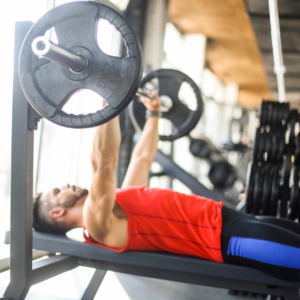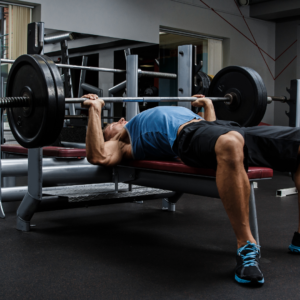Fix Your Fundamentals: Essential Lifts 101 – The Bench Press
The bench press needs no introduction – . Truth be told, it often is the introduction (“so how much do you bench?”)
As the oft-used standard, the quintessential measurement of strength, it may come as no surprise that the bench press works and tests far more that just the chest muscles that are its primary focus. That satisfaction you feel when you push the bar up and break through to a new PR? That’s a result of your entire upper body and core working together, with your legs helping to stabilize.
Your chest, anterior deltoids (front shoulders) triceps and biceps are the focus, but beyond that, your entire upper body is recruited for the bench press. Your core fires up to stabilize, and your lower body even gets some of the stabilizing work as well.
How to bench press:
The bench press seems incredibly straightforward and simple, but as with all lifts, subtle deficiencies in form can make big differences in safety and gains:
Position yourself:
SET your weight so that you’ll be just far enough under the bar that it’s easy to unrack. You should be positioned on the bench with your eyes under the bar. The bar should be low in the palm, thumb wrapped around the bar, with a tight, squeezing grip. Your grip puts your wrists in the strongest position possible.
Set your base:
It’s easy to overlook the importance of your feet while laying flat, but this is a crucial piece. Foot placement sets your base and creates a firm foundation from which you generate power.
KEEP your feet back towards your butt, as far back as you can while keeping them flat. If they’re set forward, you won’t be able to drive through with any effectiveness.
Engage and Unrack:

ENGAGE your lats – Bring your shoulder blades down and back, like trying to put them in your back pocket, and keep them there.
UNRACK the bar, straighten your arms, and hold it directly over your chest.
LOWER the bar to where it just touches your chest, but with control, not resting it on your chest or bouncing it off your chest.

TIGHTEN your glutes, drive your legs into the ground, and push the bar up.
TIPS
-Stop each rep just before lockout to keep the triceps and chest under more tension
-If you arch your back, let it be the upper to mid back, not your lower back. Keep your glutes and shoulders in contact with the bench
-Aim for your sternum to keep the path straight
-Squeeze the bar to keep your shoulders stable
WHAT TO AVOID
Flared Elbows
If your grip is too wide, your elbows may flare out. You’re unstable and you’re risking pectoral injuries.
fix:
Go over your mental checklist every time. Remembering to engage your lats before unracking the weight is a good way to keep your elbows tucked.
Bent Wrists
If your wrists aren’t straight, you’re not going to generate as much power as you could be. It’s also a good path to injury or joint problems.
Fix:
Make sure you grip the bar with it sitting in the deep, meaty part of your palms.
using the wrong leverage points
If you find your lower back coming off the bench, or find yourself using your head for leverage by pushing into bench, you’re using too much weight, or trying to get one more rep than you were truly able to. Even if it works, it’s not targeting the muscles you set out to work.
Fix:
Don’t. You’re not gaining anything from it.
Do you need a spotter?
Need is a strong word for us. You can get away without one as long as you’re smart and understand your limits. If not, you may end up calling for help or doing the roll of shame (rolling the bar down little by little to your thighs until you can sit up).
It’s much better if you have a spotter though, here more than any other lift – a spotter can genuinely help you get a bit more out of it.
Studies have shown that the mere presence of a spotter increases performance in the bench press. In a phenomenon known as social facilitation, a person’s performance in any given task often improves in the presence or under the observation of others . In a combination of psychological drives to impress when you’re being watched, and the confidence boost of having someone there if you fail (you’ll go for that rep)__. The benefits are clear, if you can, use a spotter).
The last word
Working towards an impressive bench press is an admirable goal. To get there, keep your form flawless, and implement it wisely in a program that fits your abilities while pushing you relentlessly towards your goals.
And the best way to get started, or to push yourself beyond and break through plateaus, is to have an engaged, expert guide right beside you and there for you, every step of the way. So take our quiz and get started with Stronglab Personal Fitness, the comprehensive fitness guidance that coaches you through your workout, guides you through your program and nutrition, and gives you everything you need to succeed.

